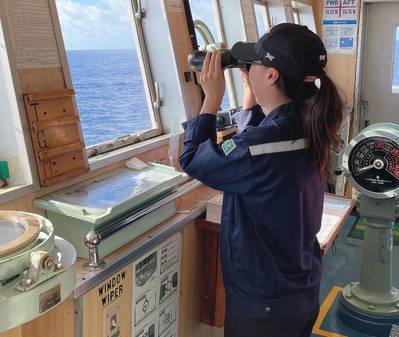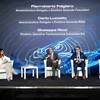Seafarer Training Needs New Fuels Overhaul
Lloyd’s Register’s (LR) Maritime Decarbonisation Hub has conducted risk assessment workshops which indicate that a comprehensive overhaul of seafarer training is required as the industry transitions to zero and near zero GHG emission fuels.
A report has been produced as a result of the workshops by the Maritime Just Transition Task Force (MJTTF), in collaboration with Lloyd’s Register’s Maritime Decarbonisation Hub and the United Nations Global Compact (UNGC) Ocean Stewardship Coalition. It marks the completion of the first milestone of the MJTTF training project for the development of a baseline training framework to equip seafarers with the skills required to safely use ammonia, methanol and hydrogen as marine fuels. It is the high-level summary of the consultations made by over 100 stakeholders during 12 hybrid risk assessment workshops, which took place earlier this year.
Zero and near zero GHG emission fuels such as ammonia, methanol and hydrogen present unique challenges and hazards to the crew’s health and safety; requiring specialized knowledge and safety measures to be adequately and effectively implemented. However, the current Standards of the Training, Certification, and Watchkeeping for Seafarers (STCW) Convention do not yet include guidelines or competency levels when specifically dealing with these green molecules.
Considerations on ammonia highlighted its toxicity as a major challenge and alluded to comprehensive training on emergency response procedures, alongside new PPE standards and process safety measures.
Similarly for methanol, key concerns included the fuel’s high flammability, requiring new fire detection methods and updated PPE protocols. Detailed training on methanol’s toxic properties and corrosivity will also be necessary in the next phase of the transition.
For hydrogen, considerations focused on issues such as flame detection and enhanced fire safety systems that would be vital for the crew, while repeating the need for new PPE protocols to be introduced to fully address hydrogen’s hazard profile.
From these stakeholder engagements, the MJTTF training project will develop detailed competency standards and a training framework to help maritime training academies and institutions further draft and implement training materials for upskilling and reskilling seafarers who will come in contact with hydrogen, ammonia and methanol as marine fuels. A roll-out of the Instructor Handbook to accompany the training framework is scheduled to take place in MTCC Asia in May 2025. The roll-out will be led by the World Maritime University (WMU), who lead this upcoming milestone as project partners.
The project is co-funded by the IMO through its technical cooperation funding, including the IMO GHG TC Trust Fund, and Lloyd's Register Foundation, an independent global charity that supports research, innovation, and education with a mission to make the world a safer place.













